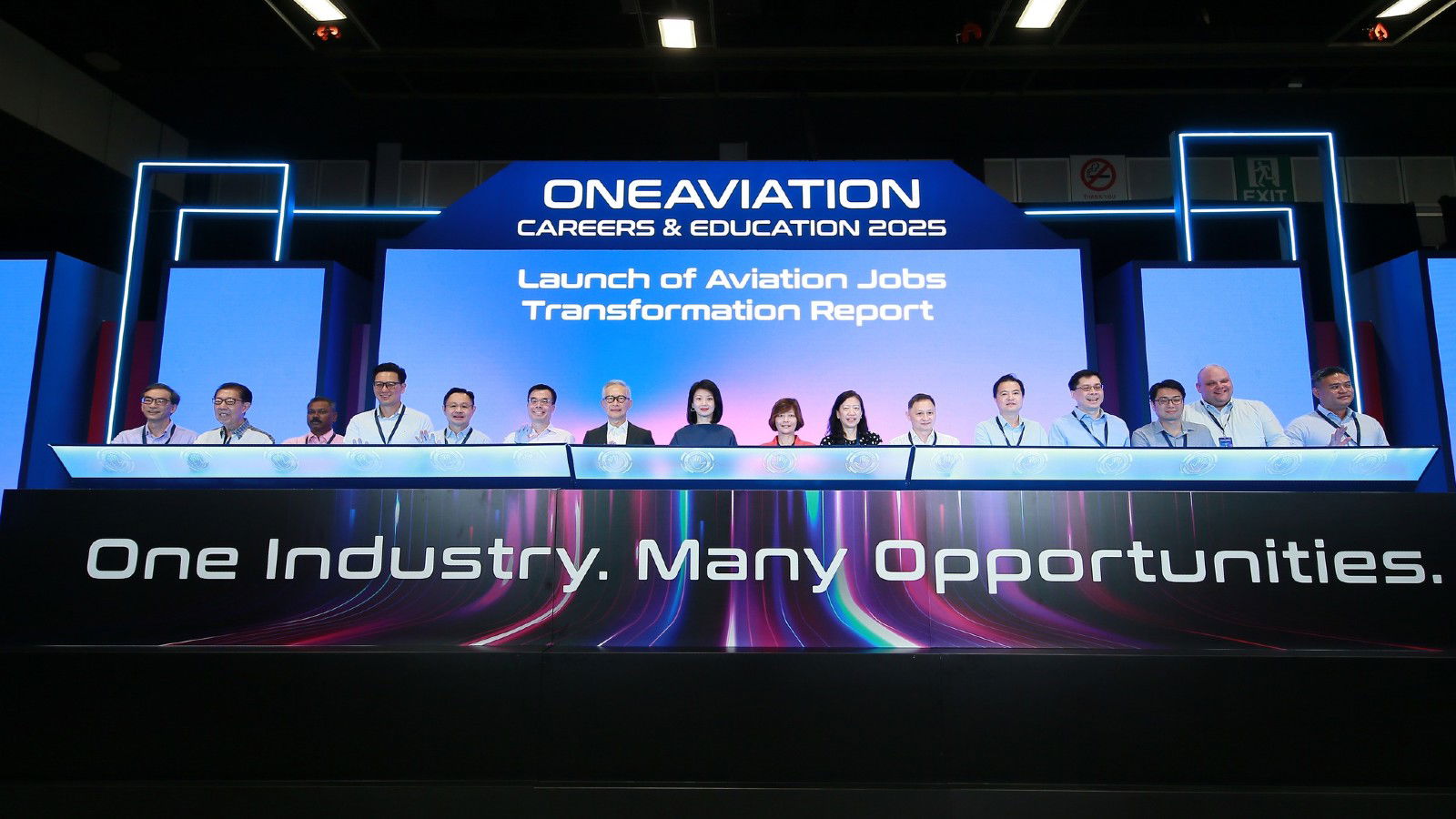share on
These changes are expected to involve up to 30% of the current aviation workforce, as the sector looks to grow in response to digitalisation, evolving workforce expectations, and more.
Singapore’s aviation sector is gearing up for significant expansion, supported by new job opportunities, stronger education pathways, and targeted funding to transform the workforce.
On 18 July 2025 (Friday), the Civil Aviation Authority of Singapore (CAAS) and Workforce Singapore (WSG) launched the Aviation Jobs Transformation Report, a first-of-its-kind study that offers a comprehensive look at the sector’s current and future manpower needs. The report was unveiled at the OneAviation Careers and Education Fair held at Suntec City Convention Centre, in partnership with the Ministry of Manpower, Ministry of Transport, SkillsFuture Singapore, Institutes of Higher Learning (IHLs), NTUC, and aviation employers.
The report marks the culmination of a year-long study, with input from more than 200 companies including Certis Group, Changi Airport Group, dnata, SATS, SIA Engineering Company and SIA Group. It outlines how the sector, which currently employs over 60,000 workers, is expected to grow in line with rising air travel demand and the development of Changi Airport Terminal 5, due in the mid-2030s.
Key roles such as pilots, cabin crew, baggage handlers, aircraft engineers, aviation security officers and in-flight chefs will remain critical to operations. In total, 31 operational job functions were identified as vital to the functioning of Singapore’s air hub.
The report also spotlights six megatrends that will reshape aviation jobs over the next five years. These include three technology-driven trends, namely:
- digitalisation,
- data and artificial intelligence (AI), as well as
- automation, along with non-technology trends, which are shifting consumer preferences, evolving workforce expectations, and sustainability.
These changes are expected to transform or create jobs for up to 30% of the current aviation workforce.
To help Singaporeans adapt to this changing landscape, the report outlines three strategic areas of action:
- strengthening education pathways,
- investing in technology and research, as well as
- providing targeted industry support.
In line with this, CAAS signed a Memorandum of Understanding (MOU) with nine IHLs on the same day. The partnership will promote talent development, curriculum updates, and structured internships that aim to prepare students and mid-career professionals for future aviation careers.
A second MOU was signed between CAAS, AI Singapore, Changi Airport Group, SATS, and Singapore Airlines to advance sector-wide AI capabilities. This collaboration aims to use AI to address key industry challenges and build a pipeline of skilled AI talent for aviation.
To further strengthen manpower development, CAAS announced the establishment of a S$200mn OneAviation Manpower Fund. The fund will support efforts to attract, develop, and retain aviation workers, and will be developed in collaboration with unions, employers and education partners. It will complement existing initiatives such as the NTUC Company Training Committee (CTC) grants and WSG’s Career Conversion Programmes.
In addition, WSG will launch an Aviation Sector Job Redesign Playbook later this year, to guide employers in identifying new skillsets for emerging roles and offer job seekers clarity on how to align their careers with evolving opportunities. Employers can also tap on the national Career Health SG platform to support workers in building resilient and fulfilling careers.
Commenting on the updates, Han Kok Juan, Director-General of CAAS, said: “The Aviation Jobs Transformation Report, the various collaboration agreements we signed and the new S$200mn OneAviation Manpower Fund CAAS set up will give a big boost to Singapore’s aviation manpower development efforts.”
Dilys Boey, Chief Executive of WSG, highlighted that the aviation sector is undergoing rapid transformation and presents many new opportunities. She stressed the importance of employers investing in job redesign and skills development, and reaffirmed WSG’s commitment to supporting both employers and workers in adapting to change.
Cham Hui Fong, Deputy Secretary-General of NTUC, added: “We will continue working closely with our OneAviation tripartite partners to ensure that workers across diverse age groups and job roles, including PMEs and older workers, can navigate transitions and seize emerging opportunities as the industry evolves.”
Lead image / Workforce Singapore Facebook
share on


